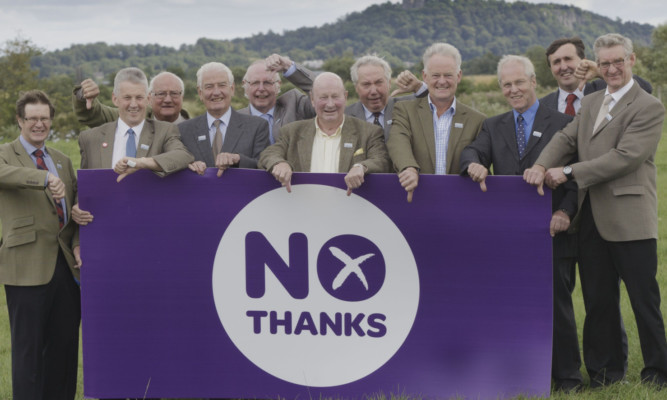Last week four former presidents of NFU Scotland John Cameron, John Kinnaird, John Ross and Jim Walker came out in favour of a Yes vote in the independence referendum.
This week it was the turn of a Rural Better Together team led by former presidents George Lyon and Sir Ian Grant. They were joined by another four former presidents, nine former vice-presidents and the immediate past chairman of Quality Meat Scotland.
Their chosen meeting place in United Auctions’ Stirling market has already seen a major debate on the referendum issue but that was back in March, and not four weeks before the vote. Perhaps that is one of the reasons why there was more passion and emotion on display than there has been to date.
The usual questions on currency and membership of the European Union were given a good airing, but there was an underlying appeal for the concept of togetherness.
Angus farmer Willie Porter said: “I have been in agriculture all my life, but there is more to this than farming.
“I have been watching the World War One commemorations and, like many families, my family lost relatives killed fighting alongside soldiers from England. I have a son-in-law who is English and English grandchildren. I do not want to live in a different country from them.
“A vote for Yes would be like breaking up a family.”
Sandy Inverarity, who farms near Dundee and was NFUS’s youngest ever president, added: “Farming does not operate in a vacuum. If there is an economic meltdown, farming will go with it and I fear living standards for everyone will fall.”
Sir Ian, an NFUS president for six years, said he was concerned about the divisions created by the referendum process, not only now but after a decision had been made.
In his experience there had never before been a schism between former NFUS office-bearers.
However, it was not a time for standing back. “This is the most important issue to emerge in my lifetime,” he said
George Lyon who as well as being an NFUS president has been an MSP, MEP and member of the EU Agriculture Committee brushed off criticism made last week by Jim Walker, who had suggested Mr Lyon had only been an interim president and had little experience of negotiating for farmers.
Mr Lyon said: “In my 25 years in agri-politics I have invariably found that when opponents revert to snide remarks it shows they are losing the actual argument.”
Buchan farmer and former NFUS vice-president Peter Chapman said: “I believe 70% to 80% of farmers are in the No camp. This is roughly the same proportion as with business people in general.
“Scottish industry sells twice as much to the rest of the UK as it does to the rest of the world.”
Mr Chapman also criticised Rural Affairs Secretary Richard Lochhead. Twice last week Mr Lochhead had sent full-page articles to national and regional publications purporting to give much-needed details on CAP greening regulations but actually devoting much of the text to making the argument for independence.
“This is an abuse of his powers,” said Mr Chapman.
All 14 on the group were particularly incensed at the suggestion that a No vote suggested a lack of ambition.
“We all passionately share an ambition for a successful agriculture. That is our fundamental vision, and it is a Yes vote which would damage these very ambitions,” concluded Mr Lyon.
On future EU membership, either within or outwith the UK, Mr Lyon said: “There has been debate about whether Scotland was more likely to remain within the EU if it was independent.
“The argument is that a UK referendum at some point in the future could take us out of the EU.
“That possibility, however, is hypothetical and depends on the one party which has said it will call a referendum being elected.
“But a Yes vote on September 18 will definitely take us out. This raises plenty of questions, such as how long it will take to be readmitted, and who foots the bill. What financial contribution will be required because there will be no UK budget rebate?”
He maintained this would certainly mean a cut in farm payments.
Richard Lochhead had said he would maintain farm payments until 2020, but would his party be in power after the 2016 Scottish election?
“Remember, Scottish membership will not be Alex Salmond’s decision. It will be the other 28 member states which decide.
“The UK has been regarded as a semi-detached member state, and these member states will not accept Scotland as having the same status,” he said. Scotland would join on very different terms, and they would not be favourable.
Sir Ian pointed to the influence NFUS office-bearers could have in the EU operating within a UK team.
As an example he had been chairman of the EU Cereals Committee, and colleagues in England, Wales and Ireland had been happy to work with him in the common UK interest.
Former Quality Meat Scotland chairman Donald Biggar pointed to the heavy dependence of the red-meat sectors on customers in the rest of the UK.
“If Scotland leaves the UK we would no longer be selling in our home market, with 75% of our beef production competing with exports from countries such as Eire where current prices are £200 a head below our own,” he said.
The position with lamb was more stark, with only 10% of Scottish production consumed at home, 65% consumed in England and 25% exported into what
Mr Biggar called a “volatile market”.
If Scotland votes to leave the UK we lose the advantage of a large and stable home market free of fluctuating exchange rates, the costs of regulation and
the extra administration involved in exporting,” he concluded.
